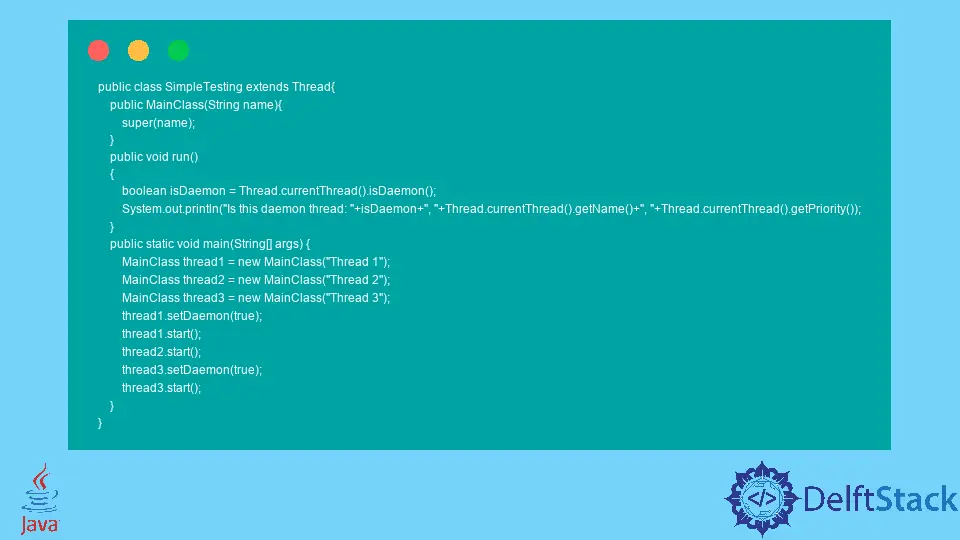Java 中的守護執行緒
Mohammad Irfan
2023年10月12日

本教程將介紹什麼是守護執行緒以及如何在 Java 中建立守護執行緒。
在 Java 中,守護執行緒是一種特殊執行緒,支援其他執行緒的後臺執行緒。Java 使用這些執行緒來為使用者執行緒和垃圾回收等提供特殊用途。
為了建立守護執行緒,Java 提供了帶有布林引數的 setDaemon() 方法。isDaemon() 方法可以檢查當前正在執行的執行緒是否是 Daemon 執行緒。
在 Java 中使用 setDaemon() 方法建立守護執行緒
在此示例中,我們使用 Thread 類的 setDaemon() 方法建立守護執行緒。我們建立了三個執行緒,其中兩個被設定為守護執行緒。我們使用 isDaemon() 方法檢查當前正在執行的執行緒是否是守護執行緒。請參見下面的示例。
public class SimpleTesting extends Thread {
public MainClass(String name) {
super(name);
}
public void run() {
boolean isDaemon = Thread.currentThread().isDaemon();
System.out.println("Is this daemon thread: " + isDaemon);
}
public static void main(String[] args) {
MainClass thread1 = new MainClass("Thread 1");
MainClass thread2 = new MainClass("Thread 2");
MainClass thread3 = new MainClass("Thread 3");
thread1.setDaemon(true);
thread1.start();
thread2.start();
thread3.setDaemon(true);
thread3.start();
}
}
輸出:
Is this daemon thread: true
Is this daemon thread: false
Is this daemon thread: true
使用 Java 中的 setDaemon() 方法建立守護執行緒
守護執行緒是低優先順序執行緒,並且始終在使用者執行緒之後執行。通過使用返回整數值的 getPriority() 方法,我們可以看到執行緒的優先順序。我們使用 getName() 方法來獲取當前正在執行的執行緒的名稱。請參見以下示例。
public class SimpleTesting extends Thread {
public MainClass(String name) {
super(name);
}
public void run() {
boolean isDaemon = Thread.currentThread().isDaemon();
System.out.println("Is this daemon thread: " + isDaemon + ", "
+ Thread.currentThread().getName() + ", " + Thread.currentThread().getPriority());
}
public static void main(String[] args) {
MainClass thread1 = new MainClass("Thread 1");
MainClass thread2 = new MainClass("Thread 2");
MainClass thread3 = new MainClass("Thread 3");
thread1.setDaemon(true);
thread1.start();
thread2.start();
thread3.setDaemon(true);
thread3.start();
}
}
輸出:
Is this daemon thread: true, Thread 1, 5
Is this daemon thread: false, Thread 2, 5
Is this daemon thread: true, Thread 3, 5
使用 Java 中的 setDaemon() 方法建立守護執行緒
我們在建立守護執行緒時將值設定為 setDaemon() 方法後啟動執行緒。這一點是非常必要的,因為如果我們將一個已經在執行的執行緒設定為守護執行緒,它將丟擲異常。我們用 thread1 呼叫 start() 方法,然後呼叫 setDaemon(),這是不允許的。請參見以下示例。
public class SimpleTesting extends Thread {
public MainClass(String name) {
super(name);
}
public void run() {
boolean isDaemon = Thread.currentThread().isDaemon();
System.out.println("Is this daemon thread: " + isDaemon + ", "
+ Thread.currentThread().getName() + ", " + Thread.currentThread().getPriority());
}
public static void main(String[] args) {
MainClass thread1 = new MainClass("Thread 1");
MainClass thread2 = new MainClass("Thread 2");
MainClass thread3 = new MainClass("Thread 3");
thread1.start();
thread1.setDaemon(true);
thread2.start();
thread3.setDaemon(true);
thread3.start();
}
}
輸出:
Is this daemon thread: false, Thread 1, 5
Exception in thread "main" java.lang.IllegalThreadStateException